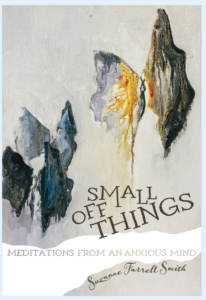 Review by Carolyn Roy-Bornstein
Review by Carolyn Roy-Bornstein
Suzanne Farrell Smith’s astonishing new essay collection is a quick read but a long contemplation; even the shortest pieces stayed with me long after I’d closed the book’s (gorgeous) cover. The structure is not chronological. We move back and forth in time with the author, from childhood to motherhood, from her early dating days to her later years as a teacher. But we are always grounded, never lost. Each chapter title is underlined by a wavy timeline, scrawled like barbed wire, with the year that the chapter covers highlighted.
The pieces range from lyrical to humorous, from hermit crab to second person point of view epistles. One of her early essays opens with a tooth extraction, complicated by needing anesthesia but suffering from anxiety, PTSD and asthma. The hole that is left becomes a metaphor for more general loss. “The more you take away, the more pain you find. The pieces hurt, but so do the empty places.”
It is an image she will return to again and again. Thinking about her and her sisters losing replaceable baby teeth as children, she writes, “We were, for only a moment, starfish.” She stays up late at night, a victim of angst-filed insomnia. She watches medical mystery reruns and contemplates amputation. “The brain goes on itching, hurting, and burning long after the limb is lost.”
The biggest loss for Smith isn’t really a loss at all. It never was. She has no memory of her father, who died when she was five—killed by a driver going the wrong way on a highway ramp. The idea that a memory may live still, lodged deep in her psyche, compels her to visit various healers and therapists searching in vain for some elusive fragment of her past. (This loss is explored more deeply in her first book, The Memory Sessions.) “The lost object is gone,” she concludes. “Nothing replaces it. And nothing bleeds into its outline, filling it, rushing back through the broken levees to take the place of emptiness.”
Motherhood, for Smith, is fraught. After a struggle with infertility, she gives birth to three boys, one with a genetic condition that only reveals itself slowly with poor feeding and missed developmental milestones, then twin boys, 30-week premies who spend 47 days in the neonatal ICU. Filled with fear and dread—of the known and the unknown—she does what comes naturally to a teacher and writer. She reads. She pulls apart words. “Are you in medicine?” one of the doctors asks her. But she is just trying to survive, breaking down the doctors’ words into their smaller, less scary, or at least more manageable, elements. “Measure heartbeats. Measure hearts. Rate incision pain while hovering over isolettes that maintain temperature, humidity and oxygen. Iso: alone, lette: small. Measure how small (very), measure how alone (I’m here).”
Smith identifies the beginnings of her anxiety as her then-boyfriend’s assignment as a news producer embedded with service personnel on an aircraft carrier in the Persian Gulf. “I assumed he would not come back.” She sinks into a major depression. She cannot sleep. She contemplates suicide. “To pass the time in my sleepless prison, I counted death options the way one might count ceiling tiles or sheep. As if lining them up on a mental shelf would neutralize them. The window. The knife. No, that knife is better. The furniture, if splintered. Vintage typewriter (very heavy).” And again, “My greatest fear, still, is not pain, but of being separated, lost, alone.”
In her concluding chapter, Smith tells the story of trying to protect her son from a horsefly who has already bitten him once in their backyard. He flees into the house, behind a screen, but she wants him to be able to enjoy the outdoors without fear. She assembles swatters and skimmers, bug spray, a towel. She fails at killing the fly, but convinces her son to return to the yard. “Come here,” she tells him. “Come back to my thighs on the patio, where the dragonflies and katydids and hummingbirds whiz by.” Smith manages to conquer her own fears in the service of helping her son manage his. How lucky he is to have been born into such wisdom. And how lucky are we to read about it.
From the Littoral Books website: Suzanne Farrell Smith is the author of The Memory Session, a memoir, and The Writing Shop: Putting Shop Back in Writing Workshop. Her work has appeared in Kenyon Review, Fourth Genre, Post Road, River Teeth, and Creative Nonfiction, as well as several anthologies. Her essay “If You Find a Mouse on a Glue Trap,” published in Brevity and republished in The Best of Brevity: Twenty Groundbreaking Years of Flash Nonfiction won a Pushcart. She lives in Connecticut with her husband and sons.
Small Off Things: Meditations from an Anxious Mind by Suzanne Farrell Smith
Littoral Books, 2023, $22.00 (soft cover)
ISBN 979898780570I
Carolyn Roy-Bornstein has reviewed books for Doctors Who Create, the Journal of the American Medical Association and for The Writer. She is the author of two memoirs and an essay anthology. Her essays have been published in the Washington Post, the New York Times, Poets&Writers magazine, The Writer, and many other venues. She is the assistant editor of creative nonfiction for Snapdragon: a Journal of Art and Healing.
